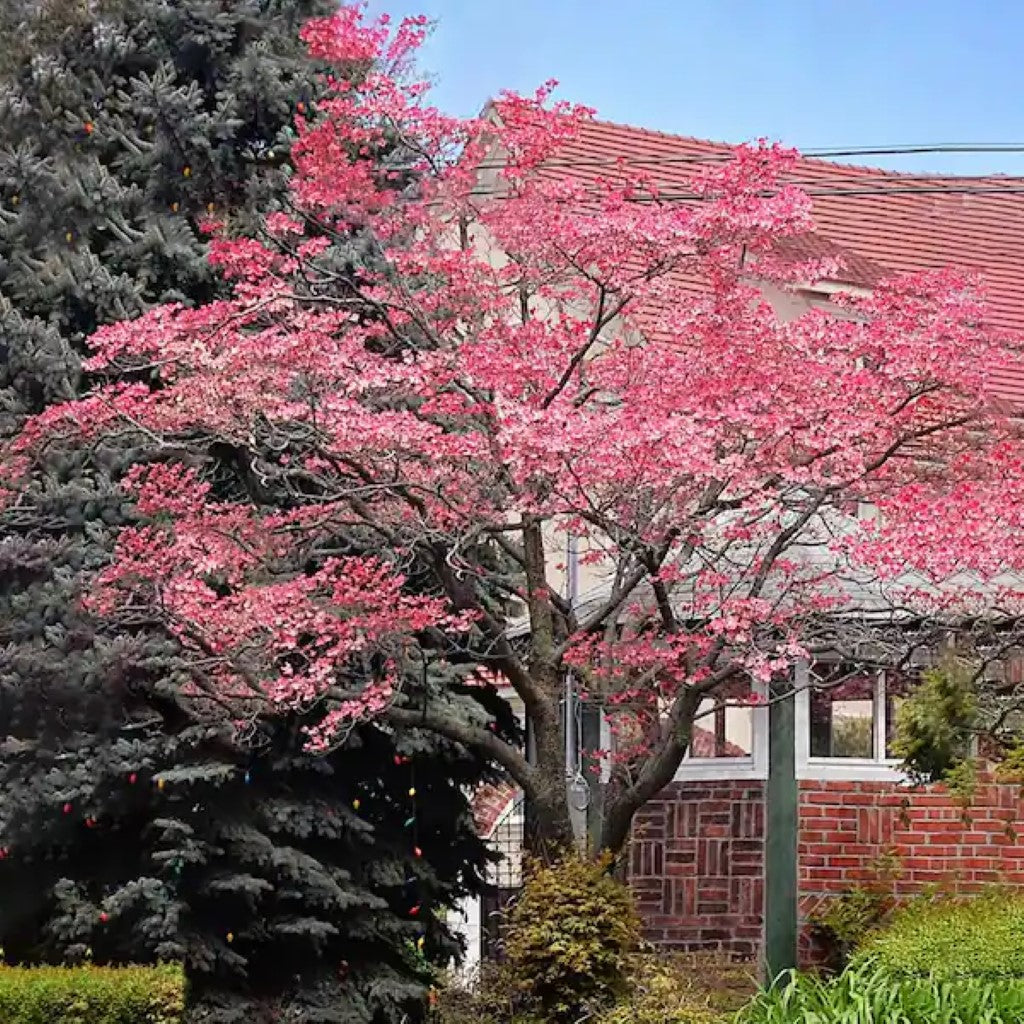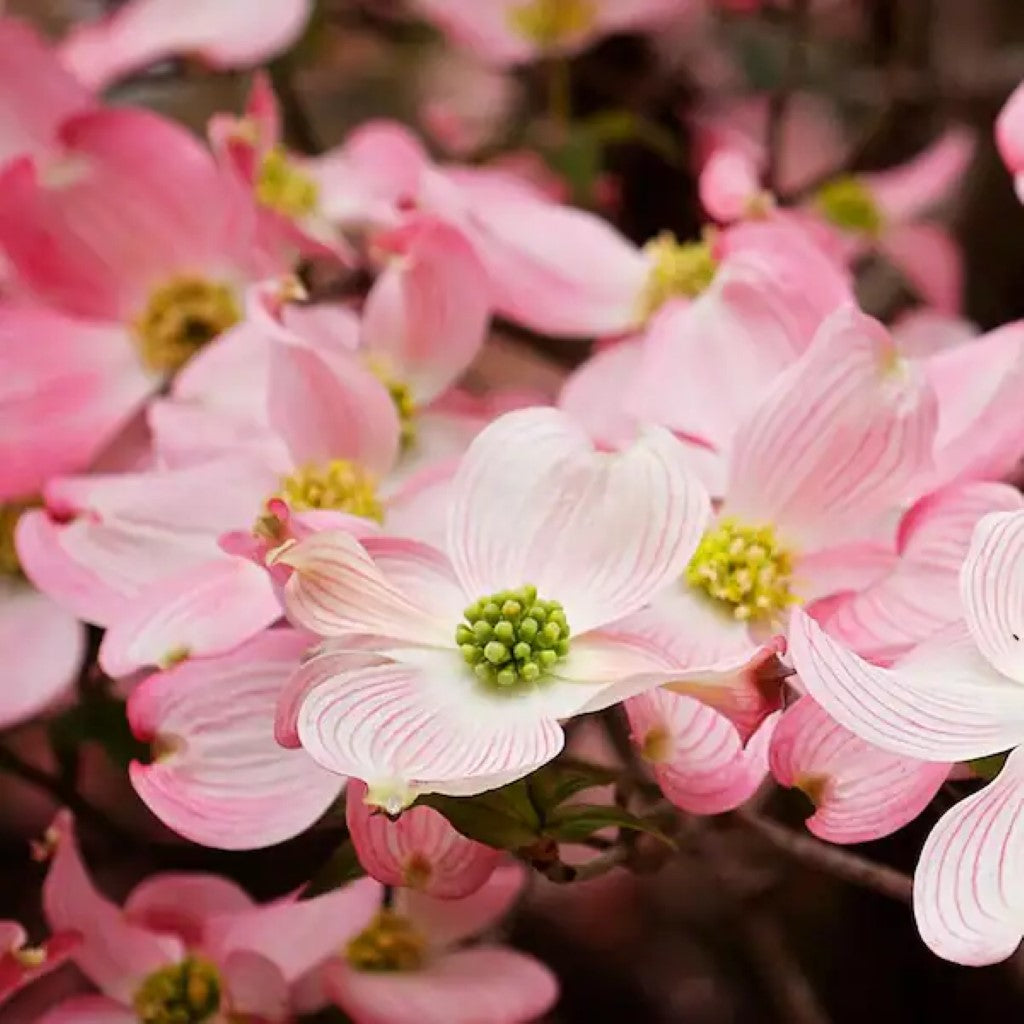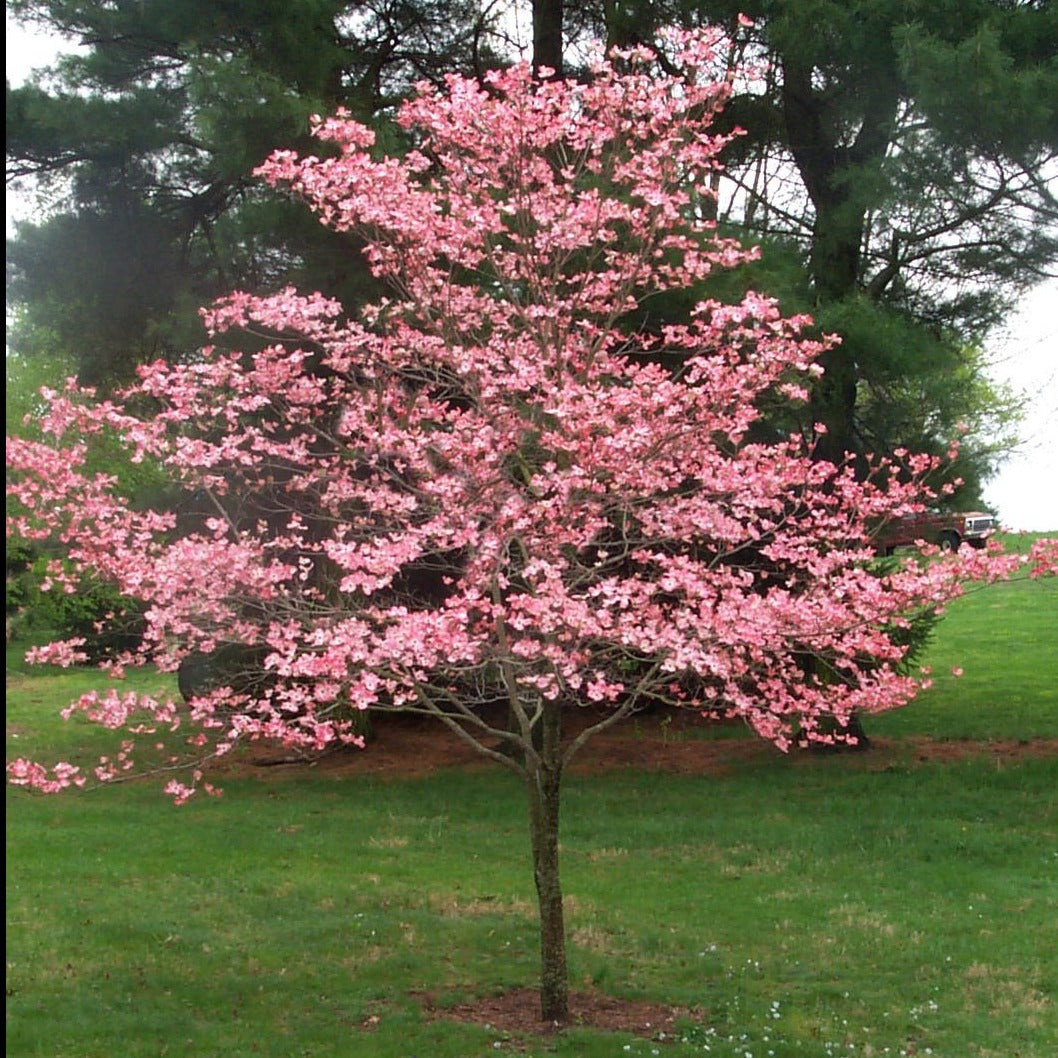🍀 Pink Dogwood Tree's Key Characteristics
The Pink Dogwood Tree, scientifically known as Cornus florida var. rubra, is a beloved ornamental tree, often cherished for its delicate pink blossoms and graceful form. One of the most striking features of the pink dogwood tree is its profusion of pink blossoms in spring. These iconic flowers, which appear in clusters, create a stunning display that signals the arrival of the spring season.
The pink flowering dogwood boasts an elegant, spreading form with flat, tiered branches. In the summer, its glossy green foliage provides a lush backdrop for garden beds and borders. As autumn comes, the leaves give off shades of red, orange, and purple, offering a spectacular display of fall color.
🌳 Origin, Growing Conditions, and Optimal Habitat For Dogwood Pink Tree
Originating from eastern North America, this iconic tree has captivated gardeners and nature enthusiasts for generations. Its origins trace back to wooded areas, where it thrives in the dappled shade of larger trees.
The pink flowering dogwood typically grows to heights of 15 to 30 feet, showcasing a spreading canopy adorned with horizontally tiered branches. With its moderate growth rate and adaptability to various soil types, the pink dogwood tree for sale is a versatile addition to any landscape, adding beauty and charm year-round. or more details and answers to - How fast do dogwoods grow?, look at the information below:
| Parameter | Details |
| Family | Cornaceae, (Cornus mas) |
| Growth Habit | Normal, like other deciduous trees |
| Height | Typically 15 to 30 feet (4.5 to 9 meters), but can vary depending on cultivar and conditions |
| Lifespan | 30 to 50 years in optimal conditions |
| Hardiness Zones | USDA Growing Zones 5 to 9 (varies by cultivar) |
| Temperature (F) | Thrives in temperatures between 60°F to 75°F (15°C to 24°C) |
| pH Range | Tolerant of a wide pH range, prefers slightly acidic to neutral soil (pH 5.5 to 6.5) |
| Sun Exposure | Partial shade to full sun |
| Watering Needs | Regular watering in drained soil, especially during dry periods |
| Pruning Requirements | Minimal pruning required; prune to remove dead or crossing branches, best done in late winter for bare root trees |
| Flowering Season | Spring, early spring |
| Flower Color | Pink blooms or white |
| Fruit Ripening Season | Late summer to fall |
| Fruit Color | Clusters of red berries |
| Fruit Flavor | Inedible for humans, attractive to birds |
| Propagation Methods | Softwood cuttings, grafting, or seeds |
| Pests and Diseases | Susceptible to anthracnose, powdery mildew, and dogwood anthracnose |
✨Care and Maintenance of Pink Dogwood Flowering Trees
Caring for your pink dogwood flowering tree ensures its health, longevity, and continued beauty in your orchard. Here are some essential tips for proper care and maintenance:
- Location : Plant your pink dogwood tree in a location that receives partial shade to protect it from the harsh afternoon sun, especially in warmer climates. Ensure the soil is well-drained to prevent waterlogging, which can lead to root rot.
- Watering : Provide regular watering, especially during the tree's establishment period and during dry spells. Keep the soil consistently moist but not waterlogged. Mulching around the base of the dogwood cornus helps retain moisture and regulate soil temperature.
- Pruning : Minimal pruning is required for pink dogwood trees. Remove dead, diseased, or crossing branches to maintain the tree's health and shape. Prune in late winter or early spring before new growth emerges.
- Fertilization : Apply a balanced fertilizer in early spring before the tree's buds break. Use a slow-release fertilizer formulated for acid-loving plants to provide essential nutrients. Avoid excessive nitrogen fertilization, as it can lead to excessive vegetative growth.
- Pest and Disease Management : Monitor your pink flowering dogwood for signs of pests such as borers, aphids, and scale insects, as well as diseases like powdery mildew and dogwood anthracnose. Treat any infestations or infections promptly, using appropriate control methods.
- Protection : Protect your dogwood pink tree from mechanical damage, such as lawnmower strikes or weed trimmers, by creating a mulch-free zone around the base of the tree. Avoid compacting the soil around the tree's root zone, as it can inhibit root growth and lead to stress.
- Annual Maintenance : Conduct an annual inspection of your pink dogwood tree for sale to assess its health and address any issues promptly. Check for signs of stress, disease, or pest infestations, and take corrective action as needed.
🔎Searching For "Where Can I Buy a Dogwood Tree"?
If you're looking to add the stunning beauty of a pink dogwood tree or searching for "pink dogwood trees for sale near me," look no further than Pixies Gardens. As a trusted provider of high-quality ornamental trees, Pixies Gardens offers a diverse selection of pink flowering dogwood trees to suit your gardening needs.
Whether you prefer shopping online or visiting our nursery to handpick the potted tree, both options are available at Pixies Gardens. With our commitment to customer satisfaction and expert guidance, you can trust us to deliver healthy dogwood pink trees that will change the beauty of your outdoors.
💡 Frequently Asked Questions (FAQs)
1. How big do pink dogwood trees get?
Pink dogwood trees typically grow to heights ranging from 15 to 30 feet, with a spread of around 15 to 25 feet. However, the size of the tree can vary depending on factors such as the specific cultivar, growing conditions, and more. At Pixies Gardens, we offer a variety of pink dogwood trees suited for different landscape sizes.
2. What is the best pink flowering dogwood?
One of the best pink flowering dogwood varieties is Cornus florida, ' '. This cultivar features large, deep pink flowers that bloom profusely in the spring, creating a stunning display. Its vigorous growth habit, disease resistance, and vibrant flower color make it a popular choice among gardeners.
3. Are pink dogwoods rare trees?
Pink dogwoods are not rare trees, but they are highly valued for their pink blossoms and good looks. While the species is native to eastern North America, pink-flowering varieties have been cultivated and bred for their striking floral displays. At Pixies Gardens, we take pride in offering top-quality 'Cherokee Brave' dogwood pink flowering trees.
4. Can I plant a pink-flowering dogwood in full sun?
Pink dogwood trees prefer partial shade to protect them from the intense heat of the full sun, especially in warmer climates. While they can tolerate some sun exposure, planting them in full sun may lead to stress, sunburn, and decreased flower production. It's best to plant rubra in locations with dappled sunlight or morning sun and afternoon shade.
Average USA Growing Zones






Comment